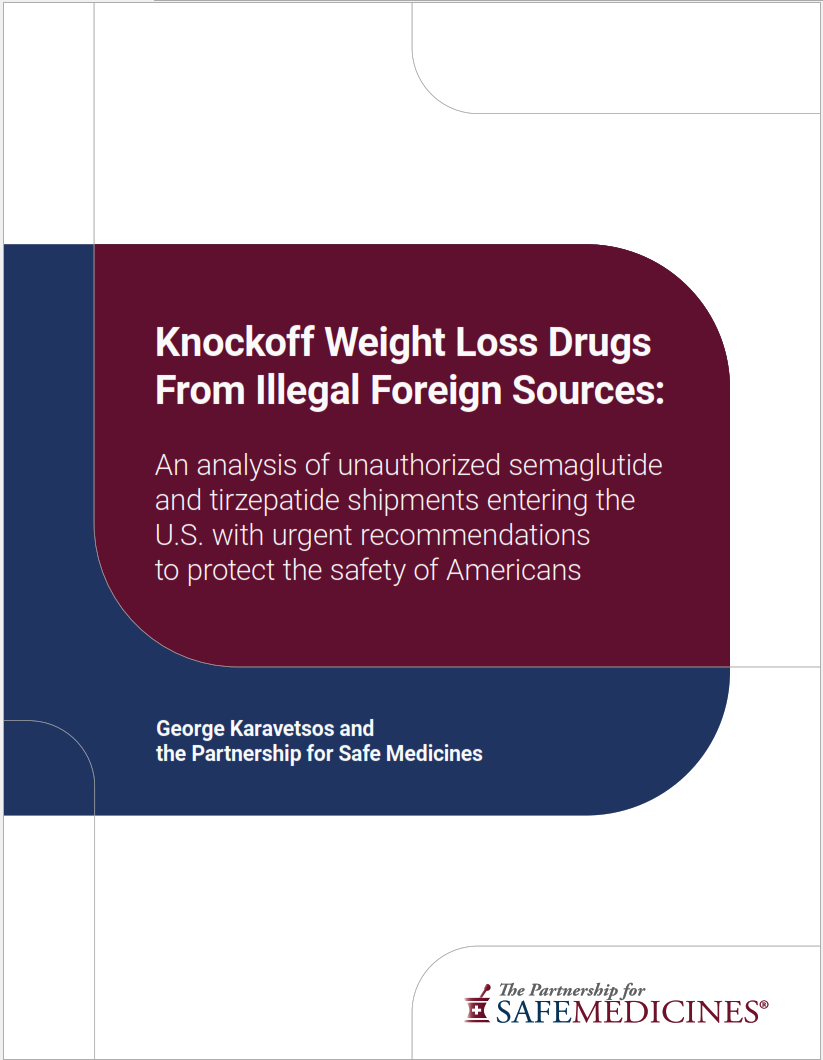New report reveals illegal ingredients for knockoff weight loss drugs flooding into U.S. from foreign sources, endangering patient safety
The Partnership for Safe Medicines and an FDA law enforcement expert conducted the first-of-its-kind analysis.
FDA regulators must enforce restrictions on unsafe drug imports to protect Americans.
WASHINGTON, D.C. (Feb. 20, 2025) – The Partnership for Safe Medicines today released a new report that found suspicious, unauthorized, and illegal ingredients for popular diabetes and obesity injectables (commonly known as weight loss drugs) are flooding into the U.S. from foreign sources despite U.S. laws forbidding them from coming through the border. The U.S. Food and Drug Administration (FDA) has warned against drug compounders’ use of unauthorized bulk drug ingredients, semaglutide and tirzepatide, which are being imported into the U.S. from several countries, including China.
“Use of compounded versions of GLP-1 medications has surged, with telehealth companies and compounding pharmacies aggressively marketing them to consumers,” said Shabbir Safdar, executive director of the Partnership for Safe Medicines. “Consumers remain largely unaware that, unlike prescription medicines, these knockoffs are not FDA-approved and they’re not generics. Our report reveals these knockoff GLP-1s may contain active ingredients from unregulated, overseas manufacturers that are not be suitable for human use.”
PSM partnered with former director of the FDA’s Office of Criminal Investigations and federal prosecutor George Karavetsos to analyze the FDA’s publicly available import dashboard against the agency’s database for registered drug manufacturers between September 2023 and January 2025 to better understand the scope and scale of the risk. Drug importers are required by law to register their facilities with the FDA to ensure the safety of the U.S. drug supply.
The report uncovered several concerning facts:
- The FDA and U.S. Customs and Border Patrol (CBP) records show 239 shipments of semaglutide and tirzepatide arrived from foreign manufacturers that failed to register their facility, an essential legal requirement to ensure the safety of the U.S. drug supply.
- The FDA stopped just 44 of these shipments, allowing 195 illegal shipments into the U.S. market, where they were likely used in knockoff products sold to unsuspecting Americans.
- 60 shipments of unregistered semaglutide and tirzepatide originated from China or Hong Kong; 42 originated from India.
- Many of these shipments were identified as ingredients for use in drug compounding. Others used even more troubling descriptions, such as “non-sterile liquids.” Semaglutide and tirzepatide are injectable products that must be sterile. The FDA has warned patients of serious and potentially life-threatening risks posed by compounders that use non-sterile ingredients to make knockoff weight loss injectables.
“Under the law, the FDA is required to block shipments of pharmaceutical ingredients from unregistered manufacturing facilities at the border,” Karavetsos said. “Yet this report shows dangerous, unchecked drug ingredients are entering the U.S. in large numbers bound for use in compounded and counterfeit products. U.S. law enforcement and regulators must ensure Americans are not exposed to the dangers of illegal drug ingredients from foreign sources.”
The report outlines several urgent actions to protect the health and safety of Americans:
- The FDA must refuse entry to any drugs that “appear” to be misbranded, adulterated, or otherwise unapproved.
- The FDA should add the rogue manufacturers identified in our analysis to the Import Alert system to flag their future shipments.
- The FDA and state boards of pharmacy should prioritize inspections of compounders that attempt to import GLP-1 API from unregistered facilities.
- The FDA must refuse shipments if their shipping information and labeling does not meet regulatory requirements.
- Compounders of GLP-1 medicines should disclose the FDA-registered manufacturer of their API to their customers as a minimal assurance of legitimacy.
“PSM respects and appreciates the FDA and CBP’s obligation, without discretion, to protect Americans from unsafe, unchecked products coming into the country from foreign sources,” Safdar said. “Despite their efforts, far too many suspicious shipments are making their way into the country. We call on the agencies to use the tools at their disposal to assure the American public that their weight loss drugs are safe. Similarly, we call on drug compounders, including medspas and telehealth companies, to operate with transparency, integrity, and responsibility to their customers.”
Click here to view the full report.
Media inquiries: editors@safemedicines.org
###
About the Partnership for Safe Medicines
The Partnership for Safe Medicines is a public health group committed to ensuring the safety of prescription drugs and protecting consumers from counterfeit, substandard or otherwise unsafe medicines. Comprised of more than 45 non-profit organizations, PSM studies counterfeit drug crime, threats to American patients, and educates the public, policymakers, and health care professionals about threats to the safety of the U.S. drug supply.


